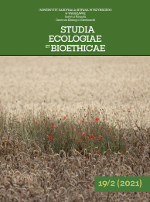Rola narracji filozoficznej w etyce cnót środowiskowych
The Role of Philosophical Narration in Environmental Virtue Ethics
Author(s): Dominika DzwonkowskaSubject(s): Education, Ethics / Practical Philosophy, Human Ecology
Published by: Wydawnictwo Naukowe Uniwersytetu Kardynała Stefana Wyszyńskiego w Warszawie
Keywords: etyka cnót środowiskowych;cnoty środowiskowe;narracja;phronesis;edukacja moralna
Summary/Abstract: Environmental virtue ethics is quite a new area of research that undertakes the issue of moral dispositions enabling actions for environmental protection. In this article, I shall present and organise the claims of narrative, environmental, virtue ethics. The aim of my analysis is to highlight the dual role of narration in this concept of ethics, which can be used as a tool for individual and social transformation. This approach corresponds to the types of moral dispositions, within the concept formed by Brian Treanor, the author of the narrative virtues ethics. The analyses carried out, helped to show the narrative as a tool allowing to get to know oneself and, or more precisely, to answer the question: who am I? To be able to define and pursue what I want to become. In this way, auto-narration becomes a tool of personal transformation (metanoi). Narration not only serves personal development, but through the language of myths, metaphors, and images, supports the promotion of desired cultural codes. In this way, narration is a very effective tool for social transformation. Two instruments are key in narration. First, on an individual level, phronesis is important to help to choose a good narrative and interpret it in the proper way. The second tool, important at the social level, is moral education, which helps to shape the moral attitudes for the development of society in the desired direction.
Journal: Studia Ecologiae et Bioethicae
- Issue Year: 19/2021
- Issue No: 2
- Page Range: 5-15
- Page Count: 11
- Language: Polish

